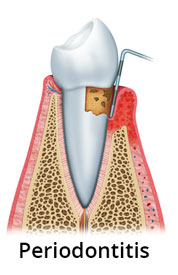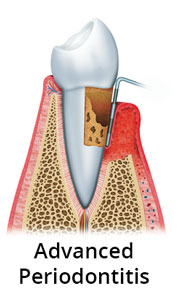Stages of Gum Disease
The Stages of Gum Disease
Gum disease is not only a disease of gums, it is an inflammation and/or infection of the dental tissues that can affect teeth and, in severe cases, even the bone that holds your teeth in their sockets. Medically, or clinically known, as periodontal disease, the term “gum disease” is often synonymously used with the term “gingivitis” and “periodontitis”.
Words to Know
Plaque: Also known as dental plaque, is the thin, sticky layer film that consists of bacteria, debris and food particles. If not removed on regular basis, it will continue to accumulate on teeth surface and will cause gum disease and tooth decay.
Calculus (Tartar): It is the hardened and rigid form of plaque that may result if the gum disease is not treated early.
Causes and Risk Factors
While plaque (and bacteria) is considered the main cause of gum disease, other risk factors such as chewing tobacco, malnutrition, alcohol consumption, smoking, higher levels of stress and certain drugs may also act as contributing or aggravating factors.
Stages of Gum Disease
On the basis of its severity, area involved and associated complications, gum disease can be divided into the following stages or types:
1st stage of gum disease (Gingivitis)
Clinically known as gingivitis (
gingival = gums, itis = inflammation), the first stage of gum disease simply refers to the inflammation of your gums.
In the early or first stage of gum disease, bacteria-laden plaque builds up gradually, eventually irritating the gums. It has been suggested that this irritation is caused due to the toxins released by the accumulated bacteria. As a result, gum becomes inflamed, may swell, redden and bleed quickly and easily while brushing the teeth.
Characteristics of the 1st stage of gum disease (Gingivitis)
 Calculus along your sensitive gum line is changed into a rough surface on which plaque accumulates.
Calculus along your sensitive gum line is changed into a rough surface on which plaque accumulates.- Tender, red, sore, and bleeding gums
- Bad breath may or may not be present.
- Spaces between the gum and tooth (periodontal pockets) may exist (though not always) due to the damages caused to the periodontal fibers that hold the gums tightly against the teeth.
- No underlying bone is involved or damaged
- This is relatively a mild form of gum disease and is easily reversible if treated early and properly
Second stage of gum disease (Periodontitis)
If the first stage is left untreated, the second stage of gum disease often results in which the plaque turns into hard tartar which would not be removed by brushing alone. Also known as Periodontitis, it is a moderately severe form of gum disease which requires aggressive treatment.
Characteristics of the 2nd stage of gum disease (Periodontitis)
 Unlike the first stage, plaque (and / or calculus) is not found “along” but “below” the gum line.
Unlike the first stage, plaque (and / or calculus) is not found “along” but “below” the gum line.- Bad breath is present.
- Tender, red, sore and bleeding gums may also be present.
- Periodontal pockets are formed as the dental tissues (gums and supportive ligaments) begin to pull away from the teeth. These pockets act as a trap for infection.
- Bone starts to show damage, often leading to loose permanent teeth.
- While relatively hard to treat, this stage can be reversed if addressed early and properly.
Third stage of gum disease (Advanced Periodontitis)
Also known as advanced or severe periodontitis, this stage represents the irreversible and complicated form of gum disease which is characterized by bone involvement, tooth decay and permanent tooth loss.
Characteristics of the 3rd stage of gum disease
 Periodontal pockets deepen and create more space for even increased bacterial activity which creates until eventually the bones holding the teeth are damaged and destroyed, leading to tooth decay and loss.
Periodontal pockets deepen and create more space for even increased bacterial activity which creates until eventually the bones holding the teeth are damaged and destroyed, leading to tooth decay and loss.- The deeper pockets may fill with pus. This pus exists between the teeth and gums and is more visible when the gums are pressed together.
- There may be swelling around the root which leads to even greater bone loss.
- Your bite is affected.
- Your permanent teeth may lose so much support that either they fall out or need to be removed forever.
- This third and the final; stage of gum disease is irreversible.
Conclusion
All in all, gum disease or periodontal disease is a common and serious oral disorder that needs to be addressed early and treated properly. Depending on the severity and its progression, gum disease can be divided into the mild (1st stage), moderate (2nd stage) and severe (3rd stage) forms. The third stage is irreversible and often results in permanent tooth loss. Therefore, the earlier you treat gum disease, the simper and easier it is to manage and cure, and the greater chance you have of restoring the original condition and health of your oral cavity and saving your gums and teeth. Finally, you must also not forget that even if you don’t notice any signs or clinical manifestations, you may still have some “silent or dormant” gum disease. Therefore, regular dental and oral examination by your dentist or periodontist is the key for diagnosing the disease early and at a reversible stage.


 View Profile
View Profile Calculus along your sensitive gum line is changed into a rough surface on which plaque accumulates.
Calculus along your sensitive gum line is changed into a rough surface on which plaque accumulates. Unlike the first stage, plaque (and / or calculus) is not found “along” but “below” the gum line.
Unlike the first stage, plaque (and / or calculus) is not found “along” but “below” the gum line. Periodontal pockets deepen and create more space for even increased bacterial activity which creates until eventually the bones holding the teeth are damaged and destroyed, leading to tooth decay and loss.
Periodontal pockets deepen and create more space for even increased bacterial activity which creates until eventually the bones holding the teeth are damaged and destroyed, leading to tooth decay and loss.